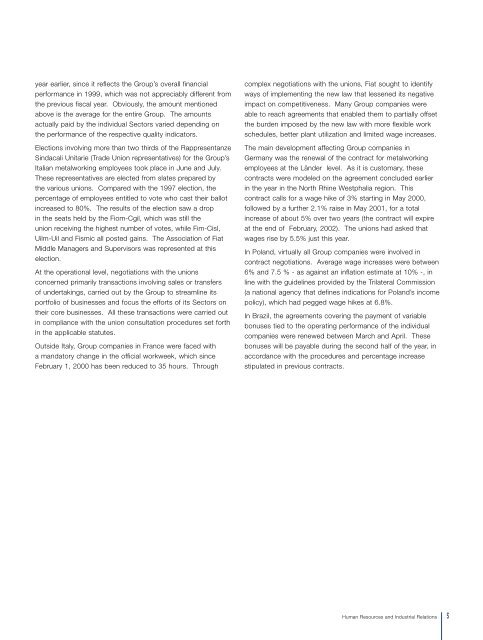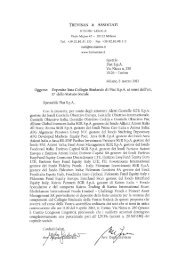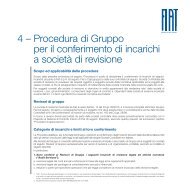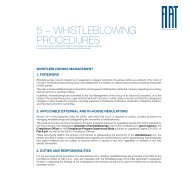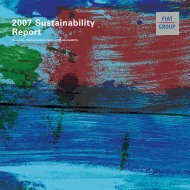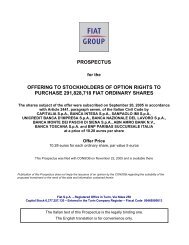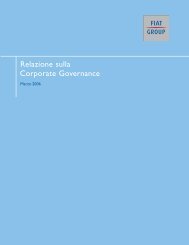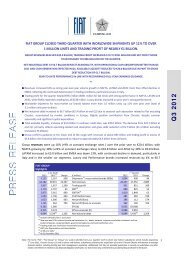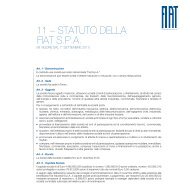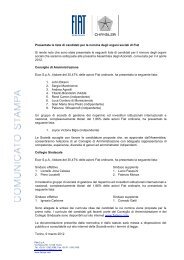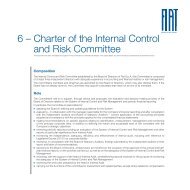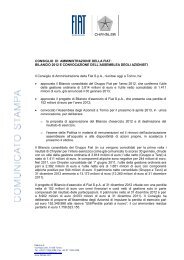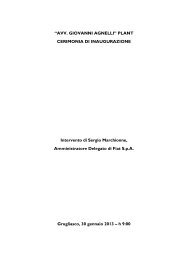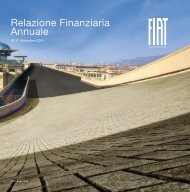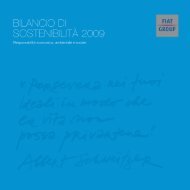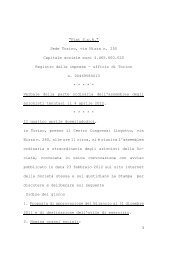Create successful ePaper yourself
Turn your PDF publications into a flip-book with our unique Google optimized e-Paper software.
year earlier, since it reflects the Group’s overall financial<br />
performance in 1999, which was not appreciably different from<br />
the previous fiscal year. Obviously, the amount mentioned<br />
above is the average for the entire Group. The amounts<br />
actually paid by the individual Sectors varied depending on<br />
the performance of the respective quality indicators.<br />
Elections involving more than two thirds of the Rappresentanze<br />
Sindacali Unitarie (Trade Union representatives) for the Group’s<br />
Italian metalworking employees took place in June and July.<br />
These representatives are elected from slates prepared by<br />
the various unions. Compared with the 1997 election, the<br />
percentage of employees entitled to vote who cast their ballot<br />
increased to 80%. The results of the election saw a drop<br />
in the seats held by the Fiom-Cgil, which was still the<br />
union receiving the highest number of votes, while Fim-Cisl,<br />
Uilm-Uil and Fismic all posted gains. The Association of Fiat<br />
Middle Managers and Supervisors was represented at this<br />
election.<br />
At the operational level, negotiations with the unions<br />
concerned primarily transactions involving sales or transfers<br />
of undertakings, carried out by the Group to streamline its<br />
portfolio of businesses and focus the efforts of its Sectors on<br />
their core businesses. All these transactions were carried out<br />
in compliance with the union consultation procedures set forth<br />
in the applicable statutes.<br />
Outside Italy, Group companies in France were faced with<br />
a mandatory change in the official workweek, which since<br />
February 1, 2000 has been reduced to 35 hours. Through<br />
complex negotiations with the unions, Fiat sought to identify<br />
ways of implementing the new law that lessened its negative<br />
impact on competitiveness. Many Group companies were<br />
able to reach agreements that enabled them to partially offset<br />
the burden imposed by the new law with more flexible work<br />
schedules, better plant utilization and limited wage increases.<br />
The main development affecting Group companies in<br />
Germany was the renewal of the contract for metalworking<br />
employees at the Länder level. As it is customary, these<br />
contracts were modeled on the agreement concluded earlier<br />
in the year in the North Rhine Westphalia region. This<br />
contract calls for a wage hike of 3% starting in May 2000,<br />
followed by a further 2.1% raise in May 2001, for a total<br />
increase of about 5% over two years (the contract will expire<br />
at the end of February, 2002). The unions had asked that<br />
wages rise by 5.5% just this year.<br />
In Poland, virtually all Group companies were involved in<br />
contract negotiations. Average wage increases were between<br />
6% and 7.5 % - as against an inflation estimate at 10% -, in<br />
line with the guidelines provided by the Trilateral Commission<br />
(a national agency that defines indications for Poland’s income<br />
policy), which had pegged wage hikes at 6.8%.<br />
In Brazil, the agreements covering the payment of variable<br />
bonuses tied to the operating performance of the individual<br />
companies were renewed between March and April. These<br />
bonuses will be payable during the second half of the year, in<br />
accordance with the procedures and percentage increase<br />
stipulated in previous contracts.<br />
Human Resources and Industrial Relations<br />
5


